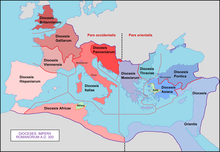The Diocese of Hispania was a late antique administrative unit (Dioecesis) of the Roman Empire on the Iberian Peninsula. It existed from 298 to about 409 AD. Its capital was Augusta Emerita. The diocese was governed by a vicarius responsible to the praetorian prefect of Gaul.


Organization
editThe Diocese of Hispania originally comprised the following six provinces:
- Hispania Baetica
- Lusitania
- Hispania Carthaginensis
- Gallaecia
- Hispania Tarraconensis
- Mauretania Tingitana (in North Africa)
The Balearic Islands were detached from Tarraconensis in the 4th century as the independent province of Hispania Balearica, becoming the seventh province within the Diocese of Hispania.
History
editThe Roman Empire was initially divided into 46 provinces, which were subdivided by Diocletian around 300 AD into 101 provinces, which in turn were grouped into 12 dioceses. At the division of the Empire in 395, the structure was changed into four prefectures, 15 dioceses and 119 provinces. With the conquest of Hispania by the Vandals, Alans, and Suebi in 409, the diocese began to collapse.
Further reading
edit- Barnes, Timothy Dacid (1982). The new empire of Diocletian and Constantine. Harvard University Press. ISBN 9780674280670. Archived from the original on 2023-05-07. Retrieved 2019-09-26.
- Mommsen, Theodor (1863). Verzeichniss der römischen provinzen aufgesetzt um 297 (in German). Retrieved Sep 25, 2019.
- Notitia Dignitatum. Retrieved Sep 25, 2019.